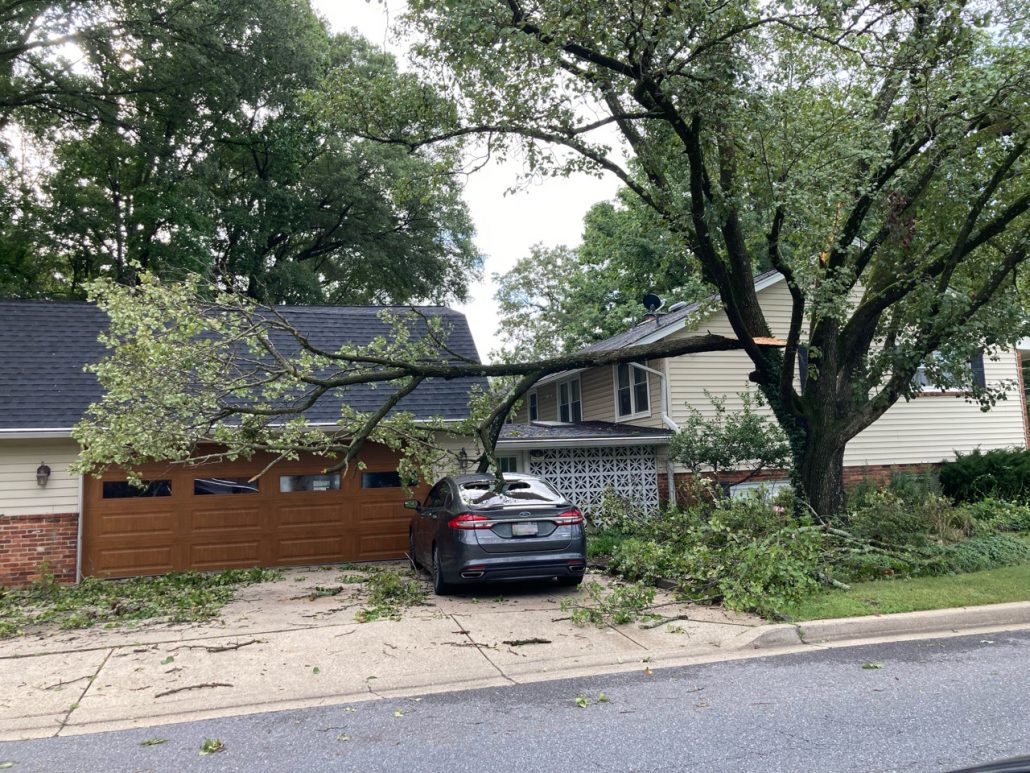By Katie V. Jones
On Aug. 5, a severe storm in Laurel brought trees down along 7th Street and Carroll Avenue, doing damage to homes and vehicles.

Credit: Michael McLaughlin
While not common, major storms like hurricanes, tornadoes and white-out blizzards are not strangers to Laurel altogether. This past summer, the Laurel History Museum marked the 50th anniversary of Tropical Storm Agnes — a June 1972 storm that became a hurricane that killed 122 people across the East Coast — with a temporary exhibit. Agnes, which caused major flooding throughout the area, was one of the most significant storms ever to hit Laurel.
According to Ann Bennett, executive director of the museum, other noteworthy disasters that have occured here include a snowstorm in 1993, Hurricane Irene in 2011 and tornadoes in 2001 and 2015.
In 2004, the Federal Emergency Management Agency (FEMA) declared September National Preparedness Month, a time each year that sees broad campaigns encouraging citizens to be prepared for disasters or emergencies in their homes, businesses and communities.
“Storms seem to be getting more frequent and stronger,” said Christina Cornwell, emergency manager for the city of Laurel. “Make sure you are prepared.”
Being prepared involves a number of steps, Cornwell said, from having a fully stocked and current first aid kit, along with canned food and bottled water, to knowing where to take shelter and how to reach important contacts.
“You can be evacuated anytime during the day, when you are at work, school, a soccer game,” Cornwell said. “If you can’t get back, where do you go to make sure you are safe?”
If you have relatives in schools, or nursing homes or assisted living homes, inform yourself about where they go if they are evacuated. Have phone numbers for those locations available.
“If phone grids are busy, have out-of-state contacts,” Cornwell said. “Text if you can’t call.”
If you have to stay in place during an emergency, make sure to have enough canned food, bottled water and prescription medicines to last a few days. Remember to have enough food for any pets you may have, too.
“Have things ready to go if you have to evacuate,” Cornwell said. “Extra cell phone chargers, walkers, canes. I wear glasses; when I get a new pair, I put the old pair in my kit.”
Important paperwork, including wills, deeds, Social Security cards, credit cards and bank statements, should be considered, too. Have the originals or copies easily accessible or stored elsewhere such as in a deposit box.
“What things can you replace if your home is completely destroyed?” Cornwell asked.
It is important to remain aware of what is happening, so you’ll need to be able to access local news. Have extra batteries available for a portable radio and use presets on your radio or keep a list of local stations. The city has a mass notification system, Cornwell noted, but residents must register for it on the city’s website.
In the event of a natural disaster or emergency, the city’s emergency operations center will open, Cornwell said. Depending on the situation, the center will oversee everything from opening emergency shelters to distributing food and water and cleaning up debris.
“There is certainly a variety of things we can do,” Cornwell said. “Hot weather. Cold weather. Power outages. It depends on the disaster and what the needs are.”
Laurel Mayor Craig Moe said the emergency operations center was “working fine” and was open during the pandemic. He praised Cornwell’s efforts to keep citizens informed on how to be prepared.
“We like to tell everybody that every month is National Preparedness Month,” Moe said. “Know the way out of your home in the event of an emergency or fire. Know where the snow emergency streets are and know where flood areas are and do not drive through flooded streets.”
“The best thing the general public can do is make sure they are prepared,” Cornwell said. “Make a kit, have a plan and stay informed.”







